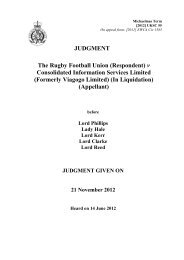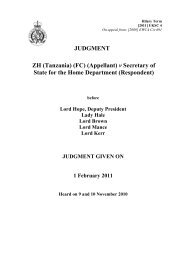Morrison Sports Ltd and others (Respondents) v Scottish Power UK ...
Morrison Sports Ltd and others (Respondents) v Scottish Power UK ...
Morrison Sports Ltd and others (Respondents) v Scottish Power UK ...
You also want an ePaper? Increase the reach of your titles
YUMPU automatically turns print PDFs into web optimized ePapers that Google loves.
PRESS SUMMARY<br />
28 July 2010<br />
<strong>Morrison</strong> <strong>Sports</strong> <strong>Ltd</strong> <strong>and</strong> <strong>others</strong> (<strong>Respondents</strong>) v <strong>Scottish</strong> <strong>Power</strong> <strong>UK</strong> plc (Appellant) [2010]<br />
<strong>UK</strong>SC 37<br />
On appeal from 2009 CSIH 92<br />
JUSTICES: Lord Rodger, Lord Walker, Lady Hale, Lord Collins, Lord Clarke<br />
BACKGROUND TO THE APPEAL<br />
At the heart of this appeal is whether a breach of certain provisions of the Electricity Supply<br />
Regulations 1988 can give rise to a private right of action.<br />
In March 1998 Mr Brian Pritchers owned two buildings, at 23 <strong>and</strong> 25 Moss Street, Paisley. The<br />
tenants of the ground floor shop at number 23 were <strong>Morrison</strong> <strong>Sports</strong> <strong>Ltd</strong>. On 6 March 1998 the<br />
building at number 23 was destroyed by fire. Two other buildings were also damaged. Investigations<br />
identified the seat of the fire as an electricity meter cupboard in number 23.<br />
Those affected by the fire, who are now the respondents, raised three separate actions for damages<br />
against <strong>Scottish</strong> <strong>Power</strong> <strong>UK</strong> plc. All three actions are framed in the same way. The respondents aver<br />
that it was the presence of a shim fitted by employees of <strong>Scottish</strong> <strong>Power</strong> that was the cause of the fire.<br />
<strong>Scottish</strong> <strong>Power</strong> deny that the shim was fitted by their employees.<br />
One of the bases on which the respondents seek to hold <strong>Scottish</strong> <strong>Power</strong> liable is that the fire was<br />
caused by <strong>Scottish</strong> <strong>Power</strong>’s breach of their statutory duty under regulations 17, 24 <strong>and</strong> 25 - relating to a<br />
supplier’s works - of the 1988 Regulations. The 1988 Regulations were made by the Secretary of State<br />
by virtue of his powers under section 16 of the Energy Act 1983. Part I of the 1983 Act, including<br />
section 16, was repealed by the Electricity Act 1989, but the power to make regulations was maintained<br />
in section 29 of the new Act. <strong>Scottish</strong> <strong>Power</strong> now accept that the 1988 Regulations have effect as if<br />
they were made under section 29 of the 1989 Act.<br />
The difference between section 16 of the 1983 Act <strong>and</strong> section 29 of the 1989 Act – <strong>and</strong>, hence, the<br />
point in dispute in the Court of Session – lies in the concluding words of section 29(3). Section 29(3)<br />
of the 1989 Act, but not section 16(3) <strong>and</strong> (4) of the 1983 Act, provides that nothing in subsection (3)<br />
“shall affect any liability of any such person to pay compensation in respect of any damage or injury<br />
which may have been caused by the contravention.” The Extra Division thought that, by enacting<br />
section 29(3), Parliament had indeed made specific provision for a private right of action for damages<br />
for loss caused by breaches of the regulations. They therefore considered that in section 29(3)<br />
Parliament had introduced an important private right of action for damages “by reservation”. <strong>Scottish</strong><br />
<strong>Power</strong> appealed to the Supreme Court.<br />
JUDGMENT<br />
The Supreme Court unanimously allows the appeal. It holds that contraventions of regulations 17, 24 <strong>and</strong> 25 of the<br />
1988 Regulations do not give rise to a private right of action. The judgment of the Court is delivered by Lord Rodger.<br />
The Supreme Court of the United Kingdom<br />
Parliament Square London SW1P 3BD T: 020 7960 1886/1887 F: 020 7960 1901 www.supremecourt.gov.uk
REASONS FOR THE JUDGMENT<br />
� There is no basis whatever for thinking that the drafter of section 29(3) of the 1989 Act<br />
intended to introduce a civil right of action but - somehow - botched that comparatively<br />
straightforward task <strong>and</strong> came up with the words in the subsection which are so singularly illsuited<br />
to the supposed purpose. Far from itself providing that a person who contravenes a<br />
provision should be liable to pay compensation, the subsection merely confirms that the<br />
liability to the criminal penalty is not to affect “any liability” of the offender to pay<br />
compensation. By “any liability” Parliament means the offender’s liability, “if any”, to pay<br />
compensation, for which regulations made under section 29 may provide [paras 16 <strong>and</strong> 27].<br />
The language used in the subsection reflects language used in earlier regulations. On the other<br />
h<strong>and</strong> there is nothing to show why the tailpiece was omitted from section 16(4) of the 1983<br />
Act [paras 18-22].<br />
� There are indications in the overall legislative scheme that a breach of the relevant provisions<br />
of the 1988 Regulations would not give rise to a private law statutory right of action.<br />
First, there are provisions in the 1989 Act <strong>and</strong> the 1988 Regulations that point strongly to the<br />
conclusion that the regulations are to be enforced by the Secretary of State <strong>and</strong> those<br />
appointed to act on his behalf, rather than by individuals raising private actions [paras 30-32].<br />
In addition, there are provisions in the 1988 Regulations which envisage situations where a<br />
consumer may be in breach of a requirement of the 1988 Regulations <strong>and</strong> where that breach<br />
may give rise to a risk of danger to <strong>others</strong>. If the respondents’ argument were correct, the 1988<br />
Regulations would confer a right of action against individual consumers of electricity for any<br />
failure to comply with a requirement under these provisions. It seems unlikely that Parliament<br />
intended the legislation to operate in that way [para 35].<br />
If it really were the case that a supplier could be held liable in damages for a contravention of<br />
any regulations made under section 29 of the 1989 Act, then the protection afforded by section<br />
21(b) of the Act (under which a supplier of electricity under section 16(1) of the Act may<br />
require any person who requires a supply of electricity to accept any terms restricting any<br />
liability of the supplier for economic loss resulting from negligence which it is reasonable in all<br />
the circumstances for that person to be required to accept) would be ineffective in the<br />
situation where the supplier’s negligence constituted a contravention of the regulations [para<br />
36].<br />
� That no private right of action is available is reinforced by the fact that it is difficult to identify<br />
any limited class of the public for whose protection the 1988 Regulations were enacted <strong>and</strong> on<br />
whom Parliament intended to confer a private right of action for breach of the provisions of<br />
the Regulations. One of the necessary preconditions of the existence of a private law cause of<br />
action is that the statutory duty was imposed for the protection of a limited class of the public<br />
[paras 38-40].<br />
NOTE<br />
This summary is provided to assist in underst<strong>and</strong>ing the Court’s decision. It does not form<br />
part of the reasons for the decision. The full judgment of the Court is the only authoritative<br />
document. Judgments are public documents <strong>and</strong> are available at:<br />
www.supremecourt.gov.uk/decided-cases/index.html<br />
The Supreme Court of the United Kingdom<br />
Parliament Square London SW1P 3BD T: 020 7960 1886/1887 F: 020 7960 1901 www.supremecourt.gov.uk



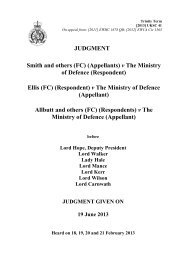
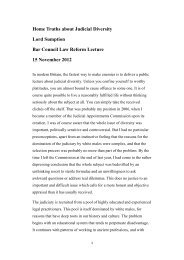
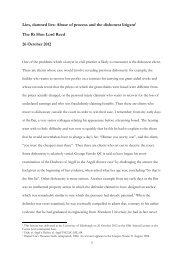


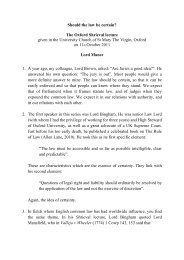
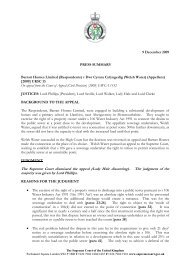

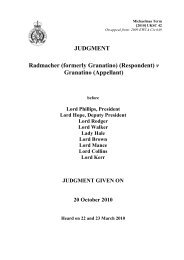
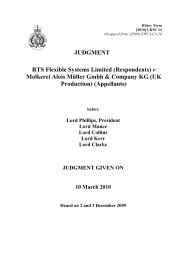
![[2009] UKSC 10 - The Supreme Court](https://img.yumpu.com/8582038/1/184x260/2009-uksc-10-the-supreme-court.jpg?quality=85)
